如何提高学生的英语作文
如何提高学生体质英语作文
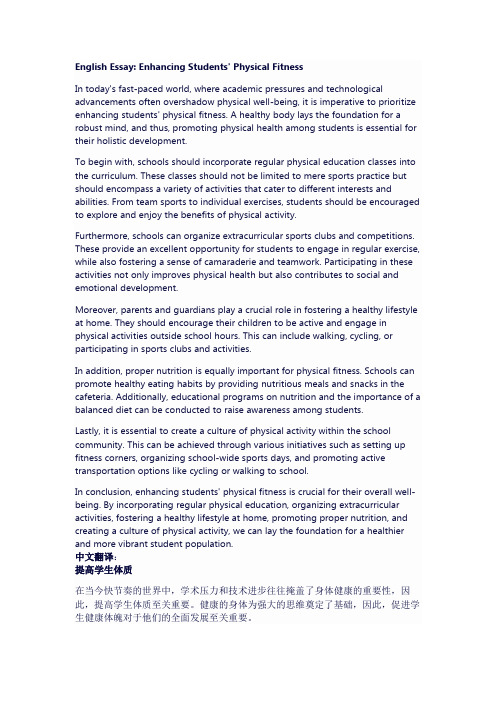
English Essay: Enhancing Students' Physical FitnessIn today's fast-paced world, where academic pressures and technological advancements often overshadow physical well-being, it is imperative to prioritize enhancing students' physical fitness. A healthy body lays the foundation for a robust mind, and thus, promoting physical health among students is essential for their holistic development.To begin with, schools should incorporate regular physical education classes into the curriculum. These classes should not be limited to mere sports practice but should encompass a variety of activities that cater to different interests and abilities. From team sports to individual exercises, students should be encouraged to explore and enjoy the benefits of physical activity.Furthermore, schools can organize extracurricular sports clubs and competitions. These provide an excellent opportunity for students to engage in regular exercise, while also fostering a sense of camaraderie and teamwork. Participating in these activities not only improves physical health but also contributes to social and emotional development.Moreover, parents and guardians play a crucial role in fostering a healthy lifestyle at home. They should encourage their children to be active and engage in physical activities outside school hours. This can include walking, cycling, or participating in sports clubs and activities.In addition, proper nutrition is equally important for physical fitness. Schools can promote healthy eating habits by providing nutritious meals and snacks in the cafeteria. Additionally, educational programs on nutrition and the importance of a balanced diet can be conducted to raise awareness among students.Lastly, it is essential to create a culture of physical activity within the school community. This can be achieved through various initiatives such as setting up fitness corners, organizing school-wide sports days, and promoting active transportation options like cycling or walking to school.In conclusion, enhancing students' physical fitness is crucial for their overall well-being. By incorporating regular physical education, organizing extracurricular activities, fostering a healthy lifestyle at home, promoting proper nutrition, and creating a culture of physical activity, we can lay the foundation for a healthier and more vibrant student population.中文翻译:提高学生体质在当今快节奏的世界中,学术压力和技术进步往往掩盖了身体健康的重要性,因此,提高学生体质至关重要。
九年级如何提高我的英语 作文
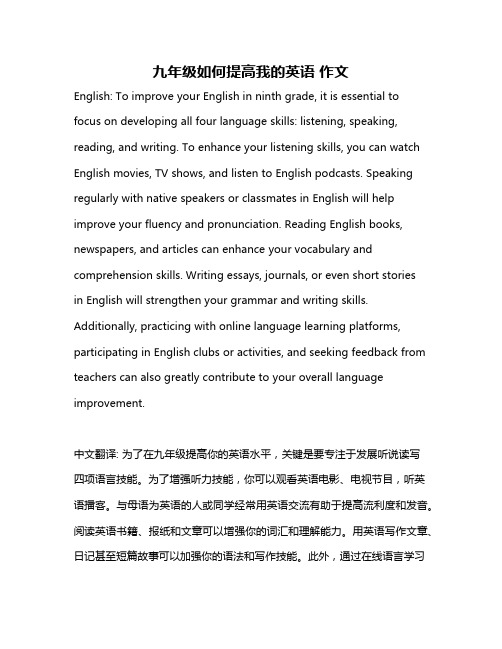
九年级如何提高我的英语作文English: To improve your English in ninth grade, it is essential to focus on developing all four language skills: listening, speaking, reading, and writing. To enhance your listening skills, you can watch English movies, TV shows, and listen to English podcasts. Speaking regularly with native speakers or classmates in English will help improve your fluency and pronunciation. Reading English books, newspapers, and articles can enhance your vocabulary and comprehension skills. Writing essays, journals, or even short storiesin English will strengthen your grammar and writing skills. Additionally, practicing with online language learning platforms, participating in English clubs or activities, and seeking feedback from teachers can also greatly contribute to your overall language improvement.中文翻译: 为了在九年级提高你的英语水平,关键是要专注于发展听说读写四项语言技能。
如何提升学生的阅读能力的英语作文
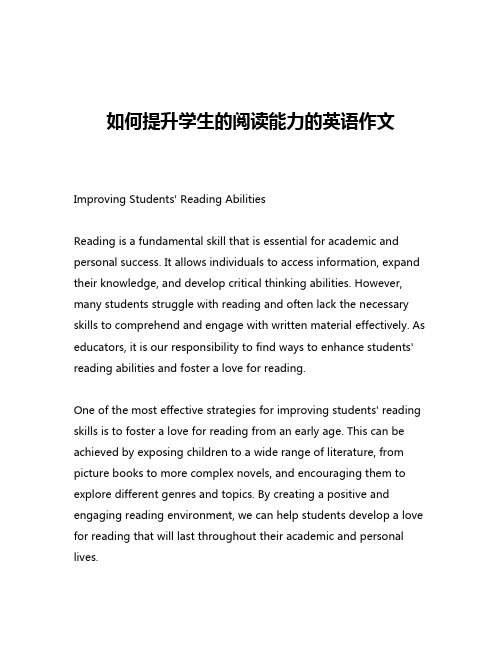
如何提升学生的阅读能力的英语作文Improving Students' Reading AbilitiesReading is a fundamental skill that is essential for academic and personal success. It allows individuals to access information, expand their knowledge, and develop critical thinking abilities. However, many students struggle with reading and often lack the necessary skills to comprehend and engage with written material effectively. As educators, it is our responsibility to find ways to enhance students' reading abilities and foster a love for reading.One of the most effective strategies for improving students' reading skills is to foster a love for reading from an early age. This can be achieved by exposing children to a wide range of literature, from picture books to more complex novels, and encouraging them to explore different genres and topics. By creating a positive and engaging reading environment, we can help students develop a love for reading that will last throughout their academic and personal lives.Another important aspect of improving students' reading abilities is to focus on developing their comprehension skills. This involves teaching students strategies for understanding the main ideas, identifying key details, and making inferences from the text. Strategies such as active reading, where students engage with the text by asking questions, making predictions, and summarizing the content, can be particularly effective in improving comprehension.In addition to developing comprehension skills, it is also important to address the issue of reading fluency. Fluency refers to the ability to read with accuracy, speed, and proper expression. Students who struggle with fluency often have difficulty understanding the text and may become frustrated and disengaged. To improve fluency, teachers can incorporate activities such as repeated readings, where students practice reading the same text multiple times, and reader's theater, where students perform a text with expression and emotion.Another key element of improving students' reading abilities is to provide them with a wide range of reading materials that are tailored to their interests and reading levels. This can involve incorporating diverse and culturally relevant texts, as well as providing opportunities for students to select their own reading materials. By allowing students to choose texts that they find engaging and meaningful, we can foster a sense of ownership and investment in the reading process.Furthermore, it is essential to incorporate explicit instruction in vocabulary development into the reading curriculum. Vocabulary knowledge is a critical component of reading comprehension, and students who struggle with vocabulary often have difficulty understanding the text. Teachers can use a variety of strategies to build vocabulary, such as teaching word roots and affixes, providing opportunities for students to engage with new vocabulary in context, and encouraging students to use dictionaries and other reference materials.Finally, it is important to recognize that improving students' reading abilities is a multifaceted process that requires a collaborative effort between teachers, parents, and the broader community. By working together to create a supportive and engaging reading environment, we can help students develop the skills and confidence they need to become lifelong readers.In conclusion, improving students' reading abilities is a critical goal for educators and parents alike. By fostering a love for reading, developing comprehension and fluency skills, providing diverse and engaging reading materials, and incorporating explicit vocabulary instruction, we can help students build the foundation they need to succeed academically and personally. Through a collaborative and comprehensive approach, we can empower students to becomeconfident and passionate readers who are equipped to navigate the complexities of the modern world.。
如何提高学习能力英文作文
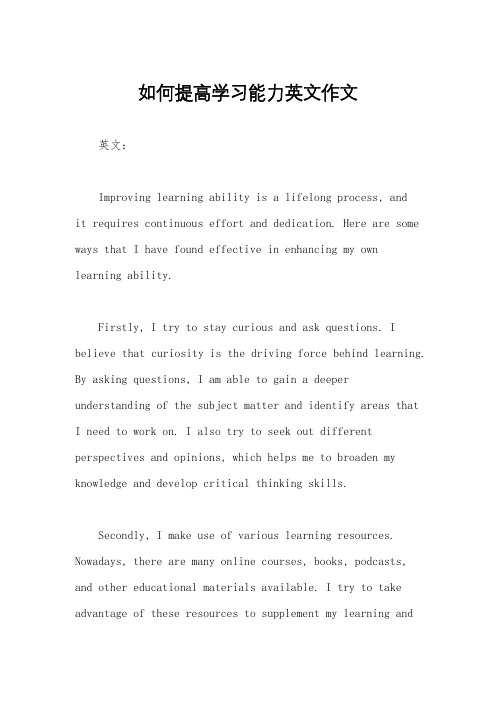
如何提高学习能力英文作文英文:Improving learning ability is a lifelong process, andit requires continuous effort and dedication. Here are some ways that I have found effective in enhancing my ownlearning ability.Firstly, I try to stay curious and ask questions. I believe that curiosity is the driving force behind learning. By asking questions, I am able to gain a deeper understanding of the subject matter and identify areas that I need to work on. I also try to seek out different perspectives and opinions, which helps me to broaden my knowledge and develop critical thinking skills.Secondly, I make use of various learning resources. Nowadays, there are many online courses, books, podcasts, and other educational materials available. I try to take advantage of these resources to supplement my learning andgain new insights. For example, I recently started listening to a podcast on history, which has helped me to better understand the context and background of certain events.Thirdly, I practice active learning. This means that I don't just passively absorb information, but actively engage with it. For example, when I read a book, I take notes and summarize the main points. This helps me to retain the information better and also makes it easier to review later on.Lastly, I try to stay organized and manage my time effectively. Learning requires discipline and commitment, and it's important to set aside dedicated time for it. I use a planner to schedule my study sessions and make sure that I am making progress towards my goals.中文:提高学习能力是一个终身的过程,需要不断地努力和奉献。
九年级学生如何提高英语成绩的英语作文

九年级学生如何提高英语成绩的英语作文全文共6篇示例,供读者参考篇1How to Get Better Grades in English When You're in 9th GradeHi everyone! My name is Timmy and I'm in 5th grade. My big sister Sarah is in 9th grade and she's been having a hard time with her English class this year. Her grades haven't been that good and she's really worried about failing. I feel bad for her because English is a super important subject. If you don't do well, it can mess up your entire GPA!Sarah came to me for advice because even though I'm just a kid, I'm actually really good at English. I read a ton of books and I get great grades on my writing assignments. My teachers are always telling me what a talented writer I am for my age. So I told Sarah I would share my tips for how she can pull up her English grade before it's too late.The first thing I told Sarah is that she needs to read more books for fun outside of class. Reading is like exercise - the more you do it, the better you'll get! It helps build your vocabulary,improves your grammar, and gets you used to different writing styles. Whenever I'm reading a good book, I learn new words and phrases that I can use in my own writing. It really helps a ton.But not just any books - you have to pick books that are a little challenging, with higher level vocabulary and complex plots and themes. Reading easy baby books won't push your English skills. For a 9th grader, I'd recommend classics like To Kill a Mockingbird, Lord of the Flies, and Romeo and Juliet. They're considered great works of literature for a reason!Sarah wasn't too excited about having to read old, boring books like that. But I explained that reading is kind of like eating vegetables - it may not be the most fun, but it's really good for you and will help you grow big and strong (metaphorically speaking, in terms of your English skills!). Great writers like Shakespeare basically invented the English language as we know it today. By reading their works, you absorb advanced vocabulary and learn how to construct beautiful sentences and grasp deeper meanings.In addition to reading more books, another crucial tip I gave Sarah is to start writing a lot more outside of class as well. Whether it's keeping a daily journal, writing short stories, or penning poems and song lyrics, the more you practice writing,the better you'll get at expressing yourself. And the best writers are always the ones who practice their craft on a regular basis. You have to develop the writing muscle!When I'm writing, I find it super helpful to read over my work out loud. That helps me catch grammatical mistakes, improper word usages, run-on sentences, and other errors. It's much easier to notice those issues when you hear your writing spoken aloud. Your brain can play tricks on you when you just read it silently!For bigger assignments like essays and papers, it's also smart to have someone else proofread your work before turning it in. A fresh set of eyes can pick up on problem areas you may have missed. I'm lucky that my mom is an amazing editor - she's always correcting my writing and suggesting revisions to make it better.Since Sarah doesn't have quite the same level of writing talent as me (she'd be the first to admit it!), I stressed that it's totally okay to ask her teacher for extra help outside of class time. That's what teachers are there for! They can go over concepts she's struggling with, review her work and pinpoint areas that need improvement, and provide more practice activities to solidify the material.I know in 9th grade it can sometimes be uncomfortable or embarrassing to ask questions in front of the whole class. But I promised Sarah that teachers always have time for one-on-one meetings and they are happy to provide extra assistance to students who are making the effort. The goal is to help you learn and get better.Another useful tip is to join a study group or find a homework buddy to exchange practice work with. Two heads are better than one when it comes to tough English assignments! Study groups are great because everyone can share knowledge, quiz each other, and clarify anything confusing. I'm part of a virtual study group for kids my age and it really helps keep me on track.Sarah said finding a good homework buddy might be tricky since a lot of the kids in her grade just want to slack off and copy each other's work. But I told her to keep looking because having an English work partner, even just one friend to proofread essays and go over reading assignments with, can make a huge difference. Team work makes the dream work!Finally, I mentioned to Sarah that listening to audiobooks and podcasts could also give her English skills a nice little boost. Hearing books read aloud by talented voice actors is excellentpractice for building stronger listening comprehension. You can follow along with the physical book too. And podcasts focused on writing, literature, and storytelling can expose you to new ideas to explore in your own creative work.Those were my top tips for Sarah to improve her grades in 9th grade English. It's definitely not easy - English can be really challenging with all the grammar rules, essays, book reports, vocabulary drills, and everything else. But if you follow this advice and put in the hard work, I'm confident you can become a stellar English student!Reading more, writing more, getting extra support, collaborating with classmates, and exposing yourself to other forms of English will absolutely pay off. Sarah got mad at first when I started bossing her around like a little professor. But now that she's been putting my tips into practice, she says her English grade has already gone up a full letter! She's finally feeling a lot more confident.The bottom line is that excelling in English just takes discipline, diligence, and an eagerness to learn. If you have that mindset, all the pieces will start to fall into place. So don't get discouraged - keep reading, keep writing, and never stop sharpening those English skills! Before you know it, you'll bepublishing award-winning novels and making the New York Times bestseller list. Well, maybe not that advanced quite yet...but becoming a true English superstar is totally achievable if you have the right approach. Never give up, keep working hard, and English mastery will be yours!篇2Title: My Big Bro's Tips for Nailing English in Ninth GradeHi there, friends! It's me, your pal Tommy, back with another awesome story to share. This time, it's all about my big brother James and how he's been rocking his English class in ninth grade. You know, when I grow up, I wanna be just like him – cool, smart, and totally crushing it in school!So, let me tell you about James' journey to English greatness. It all started last summer when he realized that his English grades weren't as stellar as he'd hoped. Instead of giving up, he got serious about improving. And boy, did he ever figure out some killer strategies!The first thing James did was read, read, and read some more. He always loved books, but now he was devouring them like a hungry monster. From classics like "To Kill a Mockingbird" to modern page-turners, he couldn't get enough. And you knowwhat? All that reading really paid off. His vocabulary skyrocketed, and he started understanding complex plots and themes like a pro.But James didn't stop there. He also started writing like crazy. Every day, he'd jot down his thoughts in a journal, crafting stories, poems, you name it. At first, his writing was a little rough around the edges, but with practice, it became smoother and more polished. His English teacher was super impressed with his improvement!Another awesome thing James did was watch movies and TV shows in English. Sure, he'd seen plenty of flicks before, but this time, he was really paying attention to the dialogue and picking up on idioms and expressions. Whenever he came across a phrase he didn't understand, he'd look it up and add it to his ever-growing vocabulary list.And you know what else helped James? Conversations, conversations, conversations! He made a point of chatting with his English-speaking friends and family members as much as possible. Sometimes, they'd even have debates or discussions about books or current events, which really pushed James to express himself clearly and effectively.But you know what I think was the most important thing that helped James succeed? His positive attitude! He never got discouraged or gave up, even when things got tough. Instead, he tackled each challenge with determination and a can-do spirit. And you better believe it paid off in the end!So, there you have it, friends – the secrets to James' English success in ninth grade. Reading, writing, listening, speaking, studying, and staying positive all played a huge role in helping him boost his scores and become a total English whiz.Now, I know what you're thinking: "But Tommy, I'm just a kid! How can I possibly do all that advanced stuff?" Well, let me tell you, it's never too early to start building those language skills. Sure, you might not be tackling Shakespeare just yet, but you can still read lots of awesome books at your level, write stories or keep a journal, and practice your English conversation skills with your friends and family.And who knows? If you start working on your English now, by the time you're in ninth grade, you might just be the next James – a total English rockstar! Just remember to work hard, stay positive, and never give up on your dreams, okay?Alright, pals, that's all for now. But you can bet your bottom dollar that I'll be following in my big bro's footsteps andbecoming an English champ myself one day. Until next time, keep on learning and growing, and don't forget to have fun along the way!Your buddy,Tommy篇3How to Get Better Grades in English Class (For 9th Graders)Hi there! My name is Timmy and I'm a 4th grader. My big sister Sarah is in 9th grade and she's been struggling with her English class this year. Her grades haven't been that great and she's pretty bummed about it. But don't worry, I've got some awesome tips that I think can really help her (and you too if you're in 9th grade!).The first thing is to pay really close attention in class. I know, I know, it can be totally boring sometimes when your teacher is just droning on and on. But you've got to fight through that boredom! Whenever your teacher is explaining something, make sure you're listening carefully and taking good notes. Ask questions if you don't understand something. Asking questions is cool - it shows you care about learning!Speaking of notes, having a great notebook is super important for English class. You're going to be doing a ton of writing, analyzing literature, learning new vocabulary words and grammar rules. You need a place to keep everything organized. Get a huge notebook with dividers to separate out all the different units you'll cover. Keep it neat and error-free. Sloppy, messy notes are no good!When you're reading books or stories for class, don't just blaze through them without paying attention. Read slowly and carefully. Jot down notes about the plot, characters, and themes as you go. Discussing and analyzing literature is a huge part of English, so make sure you really understand what you're reading on a deep level. It's not just about the basic plot points!Studying vocabulary is probably one of the most important things for English class. They'll throw a zillion new words at you all the time. Getting a handle on roots, prefixes and suffixes can help you decipher new vocab words. Go through your notes and texts and make flashcard stacks for words you don't know. Study those flashcards like crazy until you've mastered the new terms. Knowing all those vocabulary words will make your writing so much better too.Speaking of writing - you're going to be doing A LOT of it in 9th grade English. Essays, short responses, creative storytelling, you name it. Here's my best advice: start those writing assignments early! Like, as soon as you get them. Don't wait until the last minute because rushed, sloppy writing is never good. Give yourself enough time to brainstorm ideas, create an outline, write a few drafts, and revise carefully. Solid writing takes time!When you get any assignments or essays back, go through and look at the feedback your teacher wrote really carefully. Don't just glance at the grade and toss it aside. That feedback is pure gold! It's your teacher telling you exactly what you need to improve on for next time. Sit down and really think about how to apply that advice.Also, don't be afraid to meet with your teacher for extra help if you're feeling lost or struggling with certain concepts. Asking for assistance is a good thing, not something to be embarrassed about. Your teacher wants to see you succeed! Maybe you could even get a tutor if your school offers them.Okay, those are some of my best tips for rocking 9th grade English! Pay attention, take great notes, study vocabulary like crazy, start writing assignments early, apply your teacher'sfeedback, and get help when you need it. If you follow this advice, those English grades are sure to go way up in no time!Now if you'll excuse me, I've got to go make myself a snack. All this essay writing IS hard work after all! Good luck, 9th graders!篇4How to Improve My English Grades in 9th GradeHi there! I'm a 9th grader and English is one of my favorite subjects, but I've been struggling to get good grades lately. My parents and teachers keep telling me how important it is to do well in English since it's such an important language. They say it will help me a lot in the future for getting into a good university and finding a great job.I really want to improve my English grades, so I've been thinking a lot about what I can do differently. I've come up with some ideas that I think will really help. I'm going to share them with you in case you're in a similar situation and need some tips too!Read More BooksOne of the best ways to get better at English is to read, read, and read some more! The more I read, the more vocabulary words I learn and the better I understand proper grammar and sentence structure. It's like exercising a muscle - the more I use it, the stronger it gets.My teacher recommends reading books that are slightly above my current reading level to continuously challenge myself. I've found that reading fiction novels, short stories, newspapers, and magazines are all great ways to expose myself to more English.It's important to pick reading material that I actually find interesting and enjoyable. If I'm bored by what I'm reading, my mind will start to wander and I won't retain much. Some book series I've really enjoyed are Harry Potter, Percy Jackson, and The Hunger Games. I get so absorbed in the stories that I don't even realize how much I'm learning along the way!Write MoreIn addition to reading a lot, another key is to write as much as I can. Whether it's creative writing like stories or poetry, or more academic writing like essays and reports, the more I practice writing, the better I'll get at clearly expressing my thoughts.I've started keeping a daily journal to get in the habit of writing every single day. At first it felt weird and my journal entries were really short and simple. But now I'm getting more comfortable writing at length about my day, thoughts, and feelings. My English teacher was really impressed by the improvement in my writing already just from a few months of daily journaling.I also make sure to take good notes in all my classes to get more writing practice. Then I can study from my written notes when it's time to prepare for tests and exams.My parents have me write letters and emails to relatives too, which is great real-world writing experience. It's fun getting to correspond with my family while working on my English skills.Use studying ResourcesThere are so many great English studying resources available these days that can really give me an extra boost:Flashcards (physical or digital) are awesome for building vocabularyEducational websites like IXL and Khan Academy have endless English practice exercisesWatching TV shows, movies and YouTube videos in English is a fun way to improve listening comprehensionMobile apps like Duolingo make it easy to practice English for just 10-15 minutes per dayEnglish textbooks, workbooks, grammar guides and test prep books provide tons of lessons and practice questionsI try to take advantage of as many different resources as I can. Using a variety keeps篇5Title: My Tips for Getting Better at EnglishHi everyone! My name is Emily and I'm in 9th grade. English is one of my favorite subjects in school, but I know it can be really hard sometimes. I used to struggle a lot with English when I was younger, but I've learned some good tricks over the years to help me improve my grades. Let me share my tips with you!The first and most important thing is to read, read, read as much as you can! Reading is like a workout for your brain. The more you read, the better you'll get at understanding words, grammar, and how sentences are put together. You can readbooks, magazines, websites, anything! Just get in the habit of reading a little bit every single day.When you read, it also helps a lot to look up words you don't know. Keep a little dictionary with you or use one on your phone or computer. Every time you come across a word you're not sure about, look it up! Pretty soon, you'll start recognizing and remembering those new words when you see them again. Building your vocabulary is super important in English.In addition to reading, you have to practice your writing skills too. A good way to do this is to start a journal or diary and write a few paragraphs every day about anything - what you did that day, your thoughts and feelings, a funny story, etc. The more you practice writing, the more comfortable you'll get putting words together into sentences and paragraphs that make sense. Your teacher can also help look over your writing and give you feedback.When it comes to doing homework and assignments for English class, my best advice is to never wait until the last minute! English homework often involves reading something, answering questions, and writing essays or stories. If you wait too long, you'll feel rushed and stressed, and your work probably won't be your best. Instead, break it up into smaller chunks over a fewdays or a week. That way you have plenty of time to read carefully, look up words you need, and draft and edit your writing.It's also really helpful to study a little English every day, even if it's just for 20-30 minutes. You can review vocabulary words, grammar rules, literary concepts you've learned, or read a few pages of a book in English. Making English practice a consistent daily habit, even if it's a small amount, will make a big difference over time.If you're struggling with a certain area like grammar, writing essays, reading comprehension, or anything else, don't be afraid to ask your teacher for extra help! That's what they're there for. You can also ask a parent, older sibling, or friend to help explain concepts to you in a different way. Working one-on-one with someone can really help things click.Another great way to improve your English is to try to immerse yourself in the language as much as possible outside of school too. Watch movies, shows, and videos in English. Listen to English music and podcasts. Read English books and magazines for fun. The more you hear and see English in your everyday life, the more your skills will grow.I also recommend making study groups or joining an English club. Getting together with other students to practice reading, writing, discussing books/stories, and helping each other out can make learning English a lot more fun and engaging than studying alone.Most of all, you have to be patient with yourself and not get discouraged! Learning a language is really hard work, and you won't become amazing at English overnight. There will be times when you feel frustrated or like you're not making any progress. That's normal! Just keep pushing forward little by little, andcelebrate your small wins along the way. Before you know it, your English will start improving in leaps and bounds.Those are my best tips for boosting your English grades! It takes a lot of consistent time, effort and practice, but it's so worth it. Having great English skills will help you so much in school, your future career, and life in general. Just keep working hard, believe in yourself, and don't give up! You've got this!篇6How to Get Better Grades in English Class When You're in 9th GradeEnglish is a really important subject, but it can be really hard too! I'm just a kid in elementary school, but my older brother is in 9th grade and he struggles with English a lot. I've picked up some tips from him and my parents on how 9th graders can do better in their English classes.The first thing is to read, read, read! Reading is so important for learning English. You have to read all different kinds of things - books, magazines, websites, everything! The more you read, the better your vocabulary will get. You'll start picking up on how sentences are constructed properly. Reading exposes you to great writing that you can learn from.My parents make my brother read for at least an hour every day, even on weekends. He has to read novels, short stories, newspaper articles, anything! Then they quiz him on the vocabulary words he didn't know. It's a great way to learn new words in context instead of just memorizing definitions from a list.Another tip is to start writing more outside of class. English teachers love when students write extra essays, stories, journals, anything! The more you practice writing, the better you'll get at putting sentences together correctly. You'll get comfortable withgrammar rules. Your teachers will be really impressed that you're going above and beyond too.I'd recommend starting a journal or blog where you write a little bit every day, even if it's just a short paragraph. Or you could write short stories and have your friends or parents read them. The great thing about writing is you can share it with others to get feedback on how to improve.Speaking of feedback, that's another important thing - don't be afraid to ask your English teacher for extra help! Teachers are there to help you learn. If you're feeling confused about something, ask for clarification or extra practice materials. Meet with them after class or during tutoring hours. It shows you really care about doing well.You could even ask to start an English tutoring group with some classmates. Meeting weekly to go over concepts, ask questions, edit each other's writing samples, and study together can make a huge difference. Sometimes students understand explanations from peers better than from the teacher. Just being able to talk about English more is great practice.Don't forget to study hard for tests and quizzes too! Make flashcards for vocabulary words and grammar rules. Outline reading passages and annotate them with notes. Do practiceessays and short answer questions. The more you prepare, the more confident you'll feel during assessments.It's also really important to actively participate during class. Don't just sit there zoning out! Raise your hand to answer questions, even if you might get them wrong sometimes. Ask the teacher to explain things you don't understand. The more engaged you are, the better you'll learn.Lastly, I know this might sound silly coming from a little kid, but try to make English fun! Listen to music in English, watch movies and shows, and find reading materials about topicsyou're actually interested in. The more you can enjoy using English, the easier it will be to improve.English can be confusing with all its crazy spelling rules and inconsistent grammar. But if you read a ton, write a lot, study hard, get extra help when needed, and make an effort to immerse yourself in English, you'll start seeing those grades go up for sure! Just don't get discouraged. Mastering a new language takes a lot of time and practice. As long as you stay dedicated, your English skills will get better and better. Good luck!。
英语作文提高学生身体素质
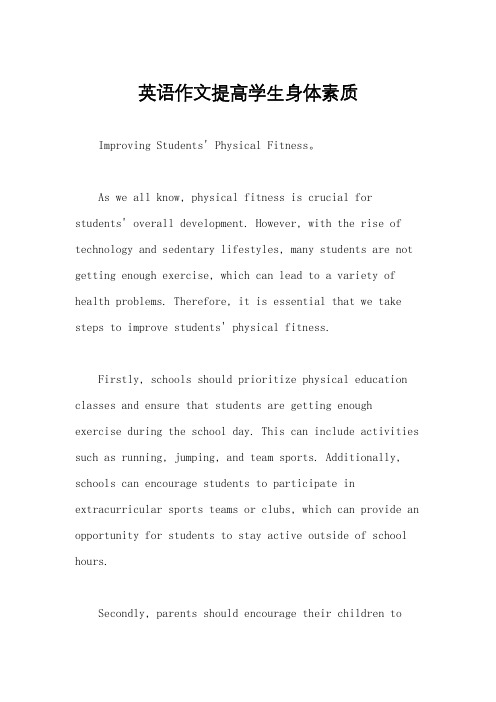
英语作文提高学生身体素质Improving Students' Physical Fitness。
As we all know, physical fitness is crucial for students' overall development. However, with the rise of technology and sedentary lifestyles, many students are not getting enough exercise, which can lead to a variety of health problems. Therefore, it is essential that we take steps to improve students' physical fitness.Firstly, schools should prioritize physical education classes and ensure that students are getting enough exercise during the school day. This can include activities such as running, jumping, and team sports. Additionally, schools can encourage students to participate in extracurricular sports teams or clubs, which can provide an opportunity for students to stay active outside of school hours.Secondly, parents should encourage their children toengage in physical activities outside of school. This can include going for walks or bike rides as a family, participating in sports leagues, or simply playing outside. Parents can also limit the amount of time their children spend on electronic devices and encourage them to spend more time being active.Finally, it is important for students to understand the importance of physical fitness and the benefits that come with it. Teachers and parents can educate students on the importance of exercise and healthy habits, and encourage them to make physical activity a part of their daily routine.In conclusion, improving students' physical fitness is crucial for their overall health and development. By prioritizing physical education, encouraging students to participate in extracurricular activities, and promoting healthy habits, we can help students lead active and healthy lives.。
提高学生创造力英语作文
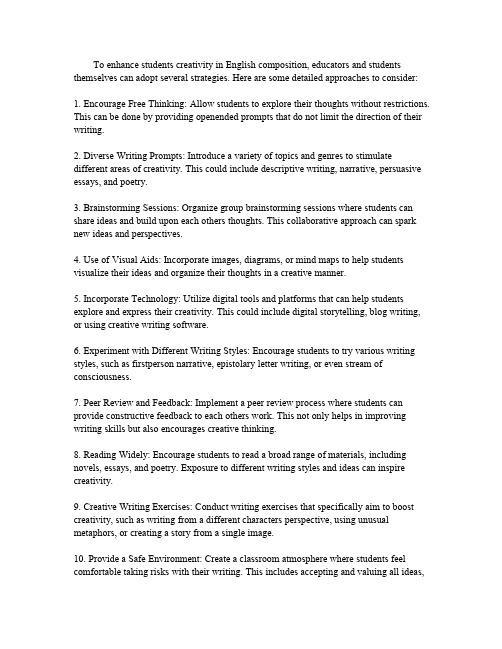
To enhance students creativity in English composition,educators and students themselves can adopt several strategies.Here are some detailed approaches to consider:1.Encourage Free Thinking:Allow students to explore their thoughts without restrictions. This can be done by providing openended prompts that do not limit the direction of their writing.2.Diverse Writing Prompts:Introduce a variety of topics and genres to stimulate different areas of creativity.This could include descriptive writing,narrative,persuasive essays,and poetry.3.Brainstorming Sessions:Organize group brainstorming sessions where students can share ideas and build upon each others thoughts.This collaborative approach can spark new ideas and perspectives.e of Visual Aids:Incorporate images,diagrams,or mind maps to help students visualize their ideas and organize their thoughts in a creative manner.5.Incorporate Technology:Utilize digital tools and platforms that can help students explore and express their creativity.This could include digital storytelling,blog writing, or using creative writing software.6.Experiment with Different Writing Styles:Encourage students to try various writing styles,such as firstperson narrative,epistolary letter writing,or even stream of consciousness.7.Peer Review and Feedback:Implement a peer review process where students can provide constructive feedback to each others work.This not only helps in improving writing skills but also encourages creative thinking.8.Reading Widely:Encourage students to read a broad range of materials,including novels,essays,and poetry.Exposure to different writing styles and ideas can inspire creativity.9.Creative Writing Exercises:Conduct writing exercises that specifically aim to boost creativity,such as writing from a different characters perspective,using unusual metaphors,or creating a story from a single image.10.Provide a Safe Environment:Create a classroom atmosphere where students feel comfortable taking risks with their writing.This includes accepting and valuing all ideas,no matter how unconventional they may seem.11.Set Realistic Goals:Help students set achievable goals for their writing,which can motivate them to push their creative boundaries.12.Celebrate Creativity:Recognize and celebrate creative efforts in writing,whether its through class awards,public readings,or sharing work with the school community. 13.Teach Writing Techniques:While creativity is important,its also beneficial to teach students about different writing techniques,such as foreshadowing,symbolism,and alliteration,which can add depth to their compositions.14.Incorporate Cultural Elements:Introduce students to different cultures and their storytelling methods.This can provide a rich source of inspiration and encourage them to think beyond their own cultural context.15.Reflect on Personal Experiences:Encourage students to draw from their own experiences,emotions,and observations.Personal narratives can be a powerful tool for creative expression.By implementing these strategies,educators can foster an environment that nurtures creativity in English composition,leading to more engaging and original student work.。
提高学生能力英文翻译作文
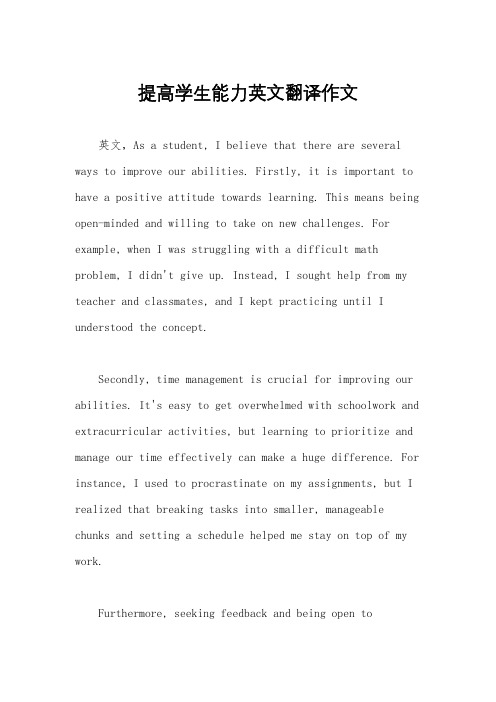
提高学生能力英文翻译作文英文,As a student, I believe that there are several ways to improve our abilities. Firstly, it is important to have a positive attitude towards learning. This means being open-minded and willing to take on new challenges. For example, when I was struggling with a difficult math problem, I didn't give up. Instead, I sought help from my teacher and classmates, and I kept practicing until I understood the concept.Secondly, time management is crucial for improving our abilities. It's easy to get overwhelmed with schoolwork and extracurricular activities, but learning to prioritize and manage our time effectively can make a huge difference. For instance, I used to procrastinate on my assignments, but I realized that breaking tasks into smaller, manageable chunks and setting a schedule helped me stay on top of my work.Furthermore, seeking feedback and being open tocriticism is essential for growth. Constructive criticism can help us identify our weaknesses and areas for improvement. I remember receiving feedback on my English writing from my teacher, and although it was initially hard to hear, it ultimately helped me become a better writer.Lastly, I believe that staying curious and constantly seeking knowledge is key to improving our abilities. Whether it's reading books, watching educational videos, or engaging in discussions with peers, there are countless ways to expand our knowledge and skills.中文,作为一名学生,我相信提高能力有几种方法。
- 1、下载文档前请自行甄别文档内容的完整性,平台不提供额外的编辑、内容补充、找答案等附加服务。
- 2、"仅部分预览"的文档,不可在线预览部分如存在完整性等问题,可反馈申请退款(可完整预览的文档不适用该条件!)。
- 3、如文档侵犯您的权益,请联系客服反馈,我们会尽快为您处理(人工客服工作时间:9:00-18:30)。
如何提高学生的英语作文
禹州市笫二高级中学时魁
英语写作过程既是应用已掌握的语言知识表达t己思想的过程也就是语言输出的过程。
英语是一门语言,和学习其他语言一样,积累是很重耍的因素。
同样对于写作來说,积累也是英语写作的基础。
万丈高楼平地起,只有有了根基, 上层建筑才能稳固。
那么小学生应该如何提高写作能力呢,大体可以从以下几个方面着手:
一、词汇积累
词汇是一篇文章最基木的组成要素。
头脑中如杲没有一定数量的、且处于鲜活状态的词汇,就无法写出好文章。
要写出好的文章,就必须善于从众多的词语屮选择和运用最恰当的词语。
因此,加强词汇教学、扩大和丰富学生的词汇量是提高学生写作能力的基础工作。
克拉中的“语言输入假说模式”认为:正确和恰当的语言输入将会使语言学习的效果更佳。
最住语言输入的两个必要条件:1) 密切相关的,2)大量的。
因此,将密切相关的常用词汇、习惯搭配适当集中教学,反复归纳、不断循环和强化是较好的词汇输入方法,同吋也保证了常用词汇在头脑屮的鲜活状态,为写作输出提供可靠保障。
二、广泛阅读
阅读是人们学习语言一种十分重耍的手段,也可以是说是语言学习的目的Z 一。
在大量的阅读过程中,学生能够开拓视野,拓展知识,增加语感,积攒必要的语言材料。
写作和阅读是互相促进、相辅相成的。
二者决不能割裂。
很多时候, 学生看到词汇和句型,只是似曾相识,却不能准确把握其含义,而通过广泛的阅读能促使学生把这些东西运用得更熟练,表达得更准确。
同时这也会有效地提高学生的阅读理解能力。
开展英语书籍阅读活动。
以读促写我在教学屮大力捉倡读书,并列出参考书目,以读促写。
在这方面,首先要明确选材原则。
一是思想性要强,内容健康;二是材料难易适合学生的实际水平;三是文章体裁多样化,趣味性强;四是语言地道、规范,其次是掌握正确的阅读方法,提倡泛读,即把重点放在针对问题快速捕捉信息上。
主要方法和技巧是根拯题目猜测文章大意;快速阅读,知英大意;根据上下文猜测词义;根据构词法猜测词义;注意深层意思的理解。
我主要选了以卜•材料作为学生进行课外阅读训练所选主要材
料:
人教社出版的与新教材课文配套的《阅读训练》;《新概念英语)Practice and Progress;《阅读理解指导与训练-阅读美国》.通过两年吋间的课外阅读分项训练,很多学生尝到了阅读的甜头,曾对我说:”做语法和语言练习还不如阅读有趣「高三时同学们纷纷要求订阅英语杂志,在我的推荐下大家订了《二十一世纪》、《英语辅导报》、《英语学习》、《英语世界》等报刊。
大量正确的课外阅读既提高了学生的阅读技巧和方法,培养了学英语的兴趣,巩固了课文小所学的好多语言知识。
阅读的同时配上笔头练习,学生的书面表达能力也得到了一定程度的提高。
提倡学生用英语记H记,以改促写我捉倡学生每周用英语写两篇13记,使写口记成为提高作文水平、发挥才情的练兵场。
并号召学生在不涉及个人隐私、能够在小范围内公开的情况下,自愿交给老师批阅。
做过学生的都明作业本发下来后,大家最关心老师的评语。
我就利用日记批语的”威力”来激发学生的英语写作兴趣,既促进学生在不断练习中提高写作水平,乂在老师与学生之间架起了情感沟通的平台。
出版班级英语作文集。
充分调动学生写作积极性针对班级学生英语写作能力普遍有了一个大的提高的实际,我产生了在毕业生中试验出版优秀作文集的设想;以全面展示同学们的英语写作成果。
学生看到自己的文章变成了手中的书,那份欣喜可想而知。
对他们的后续学习、写作起到了极大的推动作用。
实现“要我学“到”我要学”的转变,达到教会学生学习的目的。
三、加强基础写作训练,做到活学活用
狠抓基本功的训练,培养初步写作能力
1、抓好句型训练
英语语言句型丰富,句型结构固定,掌握句型是学好英语的基木功。
中学阶段句型不多,学生应学会总结、归纳学过的所冇句型。
我们应指导学生掌握句型, 多作模仿练习,让学生适应英文的表达方式,为写作打好扎实的基础。
2、抓好时态、语态的训练
屮学阶段冇许多学生搞不懂时态、语态是怎么回事,其实屮学阶段所涉及时态不过
8—1()个,如果每个时态练习造句一周(英汉互译各半)这样经过一段时间训练,就能较为清楚和熟练地掌握吋态的用法,明白了时态的用法,再学习语态的用法就容易多了。
3、结合高屮英语基础知识,进一步捉高对学生写作能力的要求
课文是学生学习英语,培养能力所依靠的主耍内容。
教师应结合课文,由浅入深,曲零散到系统地指导学生掌握写作规律。
如学了课文“A New Factory" 教师可指导学生写一篇u Our Beautiful School”。
教师可给学生提供写作屮可能使用的词汇或限定使用一些简单的语法内容,进行模仿写作。
4、冇目的、多形式地进行题材专练
英语写作实践是英语写作理论转化为写作能力的“中介”。
英语写作耍突出实践,正如学习游泳一样,写作的能力是练出来的。
课外练笔是课堂写作训练最冇益的补充,因为课堂时间有限,仅靠课堂写作训练培养学生的写作能力是不够的。
作文不是”学”出来的,而是”写”出来的。
学生必须进行大量的写作练习才能掌握并冃灵活运用各种写作技能,而月•写作技能只冇在不断写作的过程屮才能逐步得到提高和完善。
此外,学生的英语语言意识和英语思维能力的培养也需要大量的练习。
学生仅限于模仿范文写作是远远不够的,教师应有口的地训练学生根据所给文字或图示情景的要求,正确理出思路,按不同文体的要求写出一定字数文字作文或看图作文。
训练屮,教师要捉供各种文体的范文,书写格式及方法等,冇计划地进行半控制性的作文指导。
从实际操作的经验看,3到5周练习一种题材,能循序渐进地掌握其写作技巧,领悟写作步骤,形成写作思路,提高写作水平
四、重视批改和讲评
改正作文的错误要以学生为中心来进行,要放手让学生自主来写作修改以及来改正错误。
因此教师在批改作文时,不必纠正每一处错误。
严重的错误只要标出,集中解决即可。
典型的错误可以让学生共同來参与和修改,这样做可以为学生营造一个积极的氛围,培养学生相互尊重和学习的好习惯。
对于那些写的较好的,可以在全班宣读参考和借鉴。
另外,教师在写评语的时候注意避免给学生带来负面影响。
这样让学生容易接受,不会有反感和厌恶的逆反情绪。
改变评语方式让学生相互交换作文,欣赏优美句型。
五、限时训练
在高考屮,书面表达是30分,那么吋间也应该掌握在25到30分内。
学生写作时,在不限时的情况下,慢慢地精雕细琢,会写出好文章,但在特定的时间和环境里就不一定了。
这就要求教师对学生进行不定时的训练,冇了一定的基础后就进行限时训练。
在有限的时间里也能写出好文章。
概括來说,广大的中学生,如果想要写出好的英语作文,一定要注重词汇的积累和广泛的阅读,多学多练方为成功之道。
